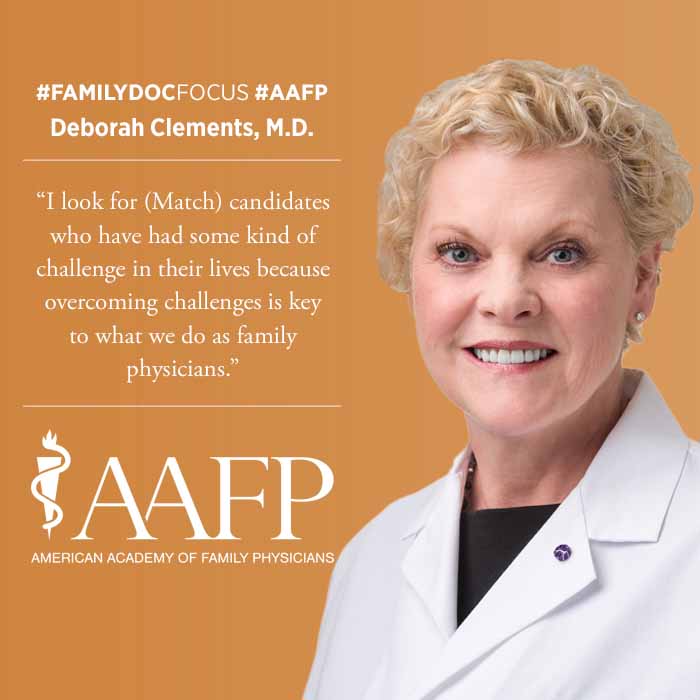Embracing Challenge to Forge Family Medicine Workforce
March 09, 2020 12:29 pm David Mitchell -- When Deborah Clements, M.D., is evaluating fourth-year medical students during the National Resident Matching Program process, she doesn't shy away from potential residents who have complicated histories.

"I look for candidates who have had some kind of challenge in their lives because overcoming challenges is key to what we do as family physicians," said Clements, professor and chair of Family and Community Medicine at Northwestern University's Feinberg School of Medicine and director of the Northwestern McGaw Family Medicine Residency at Lake Forest. "In fact, that is essentially what we do. We're given data and we have to problem-solve and come up with creative responses to our patients' challenges."
Such experiences, she said, help foster empathy and humility.
Clements speaks from experience. She earned a biology degree from the University of Michigan in 1980 and considered applying to medical school, but a male adviser pointed out that she was a middle-class woman and urged her to "try something else."
Clements settled on a solid -- but not completely satisfying -- career, working in human resources for a health care system for more than a decade. When a nursing shortage arose, Clements was inspired to go back to school. But after a semester of nursing school, she was again encouraged to try something else.
"Dear, you're a great example for the rest of the girls," an instructor told her, "but we don't see you taking orders from anyone. You should apply to medical school."
Clements went to night school for two semesters to meet medical school requirements before going to medical school at the University of Nebraska at age 33 as a single mother with children then aged 1, 9 and 12.
"We did our homework together," she said.
Clements imagined herself practicing full-scope family medicine full time, but during her third year of residency at the University of Nebraska Medical Center, she served as the resident member of the AAFP Board of Directors.
"I adored health policy and social justice," she said. "They were in my wheelhouse, and I realized I could incorporate the skills I learned in my previous administrative jobs."
After residency, Clements joined the AAFP staff, serving six years as assistant director of the Division of Medical Education. She also practiced part time and worked as a clinical assistant professor at the University of Kansas Medical Center.
Clements eventually shifted to KU full time, serving nearly a decade in roles that included professor, associate program director, program director and vice chair of education. She also was making her mark elsewhere, serving on a myriad of committees, commissions and task forces for the AAFP and the Society of Teachers of Family Medicine. By 2013, she was Board chair of the Kansas AFP.
"I was quite happy at KU," she said. "I enjoyed the students, residents and faculty there. I wasn't looking for a job, but my phone rang one day, and it was Northwestern asking if I would be interested in a department chair and directing a new residency program."
Northwestern had been on a list of "target" medical schools that didn't have a family medicine department during Clements' time on the AAFP staff. Since then, the school had started a department and opened one of the country's first teaching health center programs in Chicago's Humboldt Park neighborhood. Now, it was planning to add a second family medicine residency program in Lake Forest.
The school was offering the Chicago native a chance to come home, but the task was daunting. Clements would be moving from a medical school known for matching a high rate of students into family medicine to one that did not while also switching from a state-funded school to a private institution. There would be a lot to learn.
But Clements loves a challenge.
"I went to visit, and I couldn't come up with a 'no,'" she said. "They had all the right supports in place and gave me the leeway to start the program the way I wanted."
Northwestern, which had zero family medicine residents as recently as 2009, expects to have 72 by 2022. And the school has opened a third residency program, at Delnor Hospital in Geneva, Ill.
"Our team has been committed to the hard work needed to succeed," said Clements, who has oversight of all three programs in her role as department chair.
Clements still sees patients and precepts residents. She also has continued her leadership path at the national level. She is president of the Association of Family Medicine Residency Directors, chair of the Council of Academic Family Medicine, treasurer of the NRMP and immediate past chair of the Organization of Program Director Associations.
"I really enjoy policy work," she said. "It doesn't detract from my job, it augments it. This national work helps me connect the dots so I can have a greater impact teaching others, sending them out into world prepared to work on issues that affect our patients and our specialty."